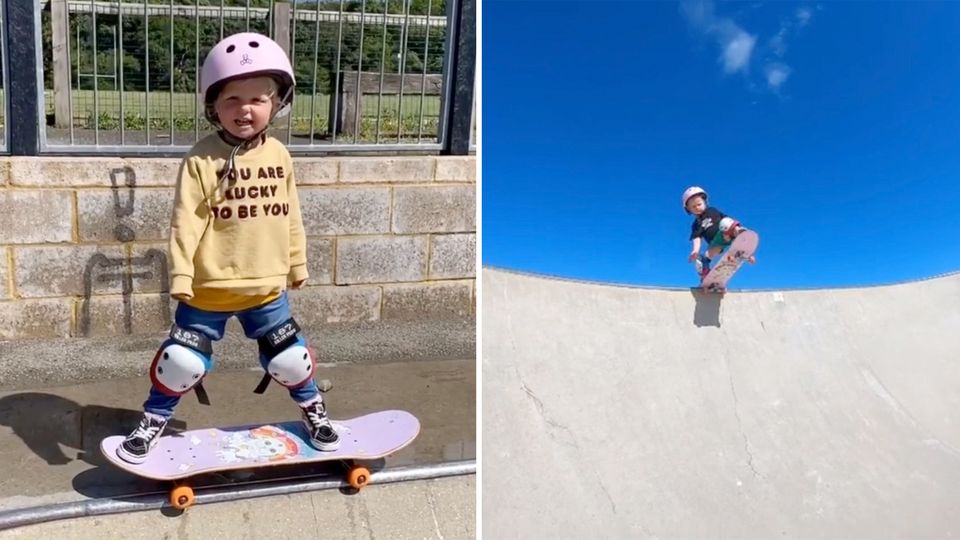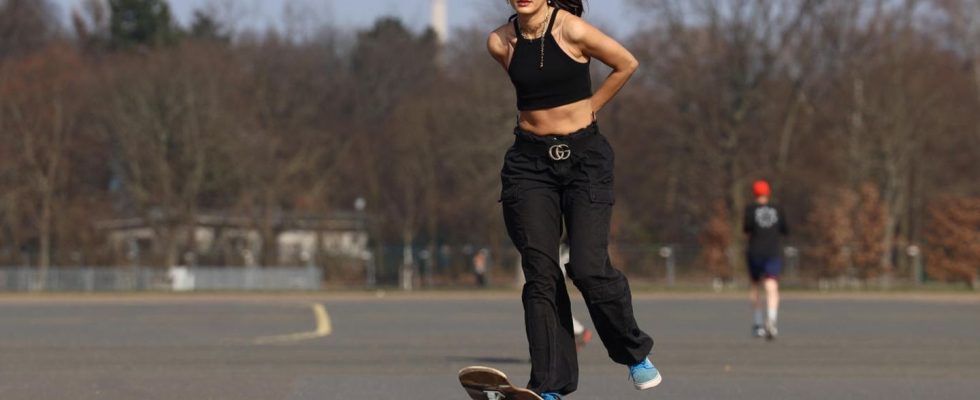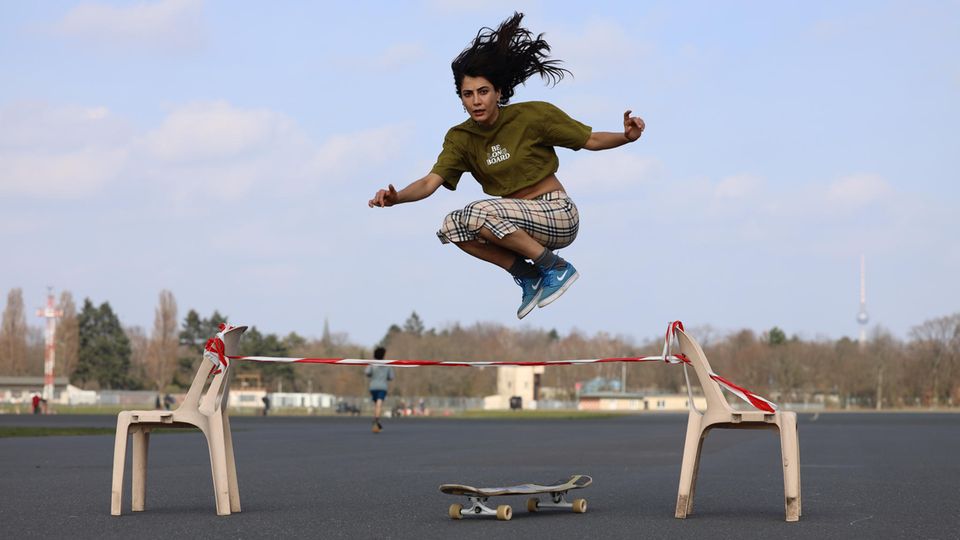Jikal Hassan is the first German-Kurdish athlete to have a serious chance of winning a title at the Longboard World Championships in Eindhoven. A conversation about her Kurdish roots, the philosophy behind longboarding and why she has not yet expressed herself politically on social media.
Jikal HassanIn the Iraq War of 1991, Kurds were militarily attacked and oppressed in their aspirations for autonomy. You were born in the middle of this war in 1991. How did this war affect your life?
I lived in Kurdistan/Iraq until I was six years old. My uncles were Peshmerga and fought in the war. They wanted us Kurds to be able to live a life of dignity in our own homeland. But that didn’t work. Escape to Germany was the only way out for our family. To this day, my family and I carry these traumas with us. For example, my mother still hoards food in response to the fear of unpredictable events. The experiences of war and flight have left deep scars, and dealing with fears is and remains a constant process.
How did you settle in as a family in Germany?
In the winter of 1996 we ended up in a refugee accommodation in Celle until we received the necessary papers to stay. We then found accommodation with a German family in Hanover and lived there for a few months until we were able to move into our own apartment.
Leaving the rest of the family behind was terrible. Without any language skills, we faced bureaucratic hurdles. Under today’s conditions, we would almost certainly not have received asylum back then and would have been sent back.
How did your experiences as a refugee child in Germany shape you?
I started working early and grew up faster than my schoolmates. I believe that this makes it easier for me today to face new challenges in life.
As a refugee child in Germany, I had to perform above average in order to even find recognition. I worked as a volunteer because I wanted to give something back to the community here. If you grow up as a child of immigrants, you are usually faced with the challenge of having to please both your own culture and the German culture. It’s very tiring, and to this day I can’t quite determine whether it was stressful or whether it gave me something.
You grew up with your brothers. Did you have to prove yourself as a young woman?
I did a lot with my brothers, playing football or skating with them, which was untypical for a girl from Kurdish circles. But that’s exactly why it appealed and challenged me. It was then about my personality and less about cultural stereotypes.
Training session on Tempelhofer Feld
© Edward Clark
Today you are active as a professional athlete. The Longboard World Championships start in Eindhoven on March 30th and you will be there. When did your passion for longboarding develop?
The first time I stood on a longboard was when a friend in Hanover lent me her new board, that was something new. Since I could already skate, it was easy for me to concentrate on the special features of the longboard: Because there was so much space on the board, I tried to dance on it while riding – and that worked. Then this video suddenly appeared on the Internet of the Longboard Girls Crew from Spain, who exuded such an incredible joy of life while riding, this attitude to life impressed me, I wanted that too.
How would you explain the philosophy behind it to someone who has never heard of longboarding?
Longboarding is a journey of self-discovery. The sport requires a lot of mental work, and skaters are said to be a little crazy in the head. If being crazy means building mental strength, facing the possibility of failure every time, falling down, getting back up every time, then I would like everyone to have this crazy mindset. The kickflip is a vivid example of how much work and failure lies behind the apparent ease of a skate and longboard trick: with the kickflip you jump up, and while you are in the air, the board rotates once horizontally around the longitudinal axis . When the board hits the ground, the base faces upwards again and you land on the board and continue riding. To do this, you have to practice this trick hundreds of times. But then you stand, then you’ve done it.
What is special about the sport is that it is still in its infancy and you now have the opportunity to help shape and shape it. We are currently laying the foundations for the next generation, which is also part of self-discovery and freedom in this sport.
Is longboarding open to all genders?
In the last few years I have seen a huge change, especially at competitions you see more and more women. When I started longboarding almost 13 years ago, I felt like I had to prove myself as a girl among the boys. Back then I would have liked to have found more like-minded people. Today there is much more promotion and visibility of women in skateboarding and longboarding. Newcomers now also have female role models such as the Olympic skateboarding champions Leticia Bufoni and Rayssa Leal. Nevertheless, I still experience prejudice when I ride my longboard, even in skate parks. I first have to show what I can do to be accepted by the local community.
On Instagram you share videos of your training sessions in which you actively prepare for the World Cup. What does a championship look like and which disciplines do you take part in?
On the one hand, the World Cup has competitions that are divided according to gender. But there is also an “Open” class in which men and women compete equally, and competitions for children and young people.
This year I’m taking part in three different disciplines: Best G-Turn, Dance and Hippy Jump. G-Turn is a maneuver where you balance with the board front or back, drawing the shape of a “G”; However, only two wheels are allowed to touch the ground at all times. In Hippy Jump you jump over obstacles, and in Dance & Freestyle you dance on the board. It depends on creativity, the level of difficulty of the tricks and the combinations.
What personal goals do you set for yourself for the future in longboard sport?
I want to shape and advance the sport. I want to continue to establish my longboard school and inspire young people. Sport has always given me an anchor, I have spent my whole life in clubs and the community there has always been my support.

I have no idea where I would be in my life today without these experiences. I would like young people to go outside more, to exercise, and not just sit in front of the screen for hours. And I hope that young women with a refugee or migrant background have the courage to take advantage of such offers and grow from them. Sport and exercise must urgently regain a higher priority in our society. I want to contribute to that.
You are strongly influenced by politics due to your migration history. Nevertheless, you only use your Instagram account for your longboard content. Why don’t you use your reach on social media to share political content?
I try to arouse emotions, joy and inspiration through my content, which of course often clashes with our political reality. I believe that sport and politics are compatible and that you can definitely make a statement, like the women in Iran who took off their headscarves at the World Cup. But I’m faced with a dilemma: sometimes I have the feeling that I’m not the right person to express myself politically. Although, as a lawyer with refugee experience, I am actually an expert. But I like the idea of becoming more political on Instagram. I’ve been exposed to other people’s political decisions my whole life, it’s part of my identity. I want to make this more visible.
What advice would you give to young Kurds who have similar dreams?
That despite the trauma, they do not see their history and that of their family as an obstacle, but rather as a source of strength and resilience. We should always draw strength from the will to fight that we Kurds are said to have. Such a struggle between the cultures in which you grow up can be a positive challenge. As a woman, as a Kurd and as part of different societies, it is crucial to further develop this strength.


